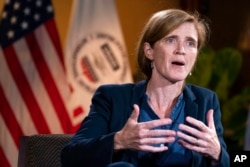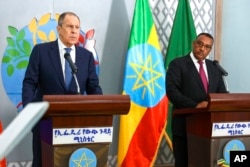A senior US official said Friday that sub-Saharan Africa was the hardest-hit region due to disruptions to the global food supply caused by Russia's invasion of Ukraine.
"Worldwide food prices are up 23% from his year ago, but sub-Saharan Africa, where food consumes 40% of household budgets, is hit hardest." Ambassador Linda Thomas Greenfield told an audience at the university. Accra Ghana. “Regardless of how you feel about Russia, we all have a strong common interest in mitigating the impact of war with Ukraine on food security.”
Thomas Greenfield, the United States Special Envoy to the United Nations and member of President Joe Biden's Cabinet, is embarking on a four-day tour of Africa this week, with stops in Uganda, Ghana and Cape Verde. He focuses on the impact of food insecurity on the continent.
She has been working with her all over the world, in part due to her COVID-19 pandemic, before Russia invaded Ukraine, the world's leading grain and vegetable oil producer. He stressed that more than 190 million people were food insecure.
"Well, since Russia's one-sided war, full-scale invasion of Ukraine, we estimate that number could increase to her 230 million." She said Thomas-Greenfield. “That means more than 40 million people have become food insecure since [Vladimir] Putin chose to invade a neighboring country and steal its land. That is more than the entire population of Ghana.
While in Accra, she announced more than $127 million in new humanitarian aid for Africa, with a focus on refugees and displaced persons.
Enhanced Diplomacy

Thomas Greenfield is not alone. US officials visiting the area. USAID Director Samantha Power was in the Horn of Africa recently, and Secretary of State Anthony Brinken headed to South Africa, Rwanda and the Democratic Republic of the Congo starting Sunday.
Since starting the war with Ukraine, Russia has stepped up its own efforts to strengthen ties with the continent. did.
Many African governments, feeling conflicted between the superpowers, have tried to remain neutral. Shortly after the February 24 invasion of Moscow, the UN General Assembly called on Russia to end its military campaign. Only one African state of Eritrea voted against the resolution, while nearly half of the remaining 54 states abstained or did not vote.
"There are also voices saying that Africans do not want to be pressured to take sides or take a particular position," the US ambassador acknowledged. "I understand that. None of us want a repeat of the Cold War, and Africans have the right to determine foreign policy positions, free from pressure, manipulation and threats."

She criticized Russia's misinformation, particularly the Kremlin's ability to sell its food and fertilizer exports to the United States and other Western countries.
"Again, US sanctions do not apply to food or fertilizer exports," she said. rice field.
Thomas-Greenfield said Moscow had blocked its exports, imposed quotas on nitrogen and compound fertilizers, and imposed tariffs on grain exports. She also described how the Russian military set out to sabotage and destroy the Ukrainian agricultural sector by mining farmland, destroying equipment and bombing grain silos. , this is hurting Africa," she said. "Russia and Ukraine supply more than 40 percent of Africa's wheat supply." Moscow will get help to alleviate the concerns global insurers and shippers have to deal with, while starting to go through the Russian exports when faced with sanctions in banking and other sectors. Wheat prices have already started to fall, two weeks after the deal was signed in Istanbul.
Thomas-Greenfield advocates for Ghana and other African nations to explore the potential of being self-sufficient and more insulated from global shocks, while at the same time feeding the world market. urged to improve Part of the aid package she announced includes her $2.5 million to help Ghana improve fertilizer production and imports for farmers.
"Now is the time to feed the future and turn Ghana and other African nations into your own breadbasket," she urged. Sex is infinite, and there is no moment to lose."


